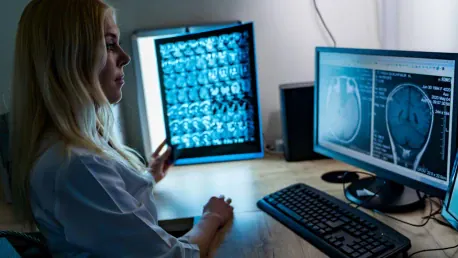What if your next medical diagnosis could be faster and more accurate thanks to cutting-edge AI advancements? The rapid evolution of AI technology in the medical imaging sector promises significant improvements in diagnostic precision, transforming healthcare delivery.
Growing Demand for Accurate Diagnostics
Traditional radiology faces myriad challenges, from diagnostic errors to long wait times for results, as well as issues with accessibility. These drawbacks have spotlighted an urgent need for improved healthcare services. AI stands poised to address these needs, leveraging state-of-the-art algorithms to enhance diagnostic processes. Broader trends show a growing reliance on digital solutions, further accelerated by the pandemic era, making AI integration more relevant and vital than ever.
AI’s Impact on Medical Imaging
AI-powered diagnostic tools are changing how medical images are analyzed. Advanced algorithms can interpret results and generate comprehensive reports, which streamline the diagnostic process. AI’s ability to minimize human error and expedite diagnosis is extending access to expert health services across the globe. Recent technological advancements and studies support AI’s pivotal role in improving diagnostic accuracy and efficiency. For instance, research published in respected journals highlights AI’s capacity to rival human experts in interpreting complex medical images.
Expert Insights on AI in Healthcare
Leading experts in AI and medical imaging champion the integration of AI in healthcare. Healthcare technologists and radiologists emphasize AI’s potential to offer a second opinion, cutting down diagnostic errors significantly. Case studies illustrate successful AI applications, such as a recent project where AI identified rare conditions overlooked by human clinicians. Research findings underscore AI’s capabilities, showing how AI-enhanced tools can surpass traditional methods in diagnostic accuracy.
Advancing Practical Applications
Healthcare institutions are identifying practical steps to integrate AI into diagnostic processes. Strategies are being developed to address potential challenges like data privacy and biases in AI models. Continuous human oversight ensures reliability and accuracy while fostering collaboration between AI and medical professionals. This symbiotic relationship underscores the importance of AI in supporting rather than replacing human judgment.
Healthcare facilities are adopting AI technologies in diagnostic pathways, incorporating sophisticated algorithms into their workflows, and training staff to collaborate effectively with these tools. Maintaining rigorous data security protocols remains crucial, as does the commitment to mitigating biases through regular model updates and cross-referencing results with human expertise.
Reflections and Forward-Looking Considerations
Reflecting on these advancements, the healthcare sector is poised to see transformative changes driven by AI. Future strategies include scaling AI integration, enhancing training for medical professionals, and prioritizing patient data security. AI’s role is to supplement and enhance human expertise, ensuring refined diagnostic accuracy and quicker turnaround times.
Healthcare leaders should consider continuous improvements in AI models, balanced with stringent oversight, and seek collaboration opportunities to innovate further. Embracing these steps promises a new era in radiology, characterized by enhanced precision and efficiency.
AI technology in radiology has undeniably altered the landscape of medical diagnostics, offering a promising future for timely and accurate healthcare delivery.









